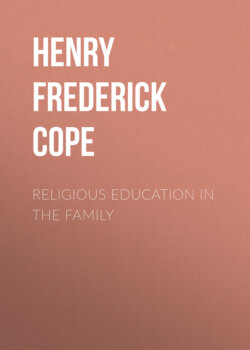Читать книгу Religious Education in the Family - Henry Frederick Cope - Страница 32
На сайте Литреса книга снята с продажи.
§ 3. THE EDUCATIONAL PROCESS
ОглавлениеNormal persons never stop growing. Just as children grow all the time in their bodies, so do adults and all others grow all the time in mind and will and powers of the higher life whenever they live normally. We grow spiritually, not only in church and under the stimulus of song and prayer, but we grow when the beauty of the woods appeals to us, when the face lightens at the face of a friend, when we meet and master a temptation, when we brace up under a load, when we do faithfully the dreary, daily task, when we adjust our thoughts in sympathy to others, when we move in the crowd, when we think by ourselves. The educational process is continuous. The children in the home are being moved, stimulated, every instant, and they are being changed in minute but nevertheless real and important degrees by each impression. There is never a moment in which their character is not being developed either for good or for ill. Religious education—that is, the development of their lives as religious persons—goes on all the time in the home, and it is either for good or for ill.
Next to the idea of the continuous and all-pervasive character of this process of religious development the most important thought for us is that religious education in the home may be determined by ourselves. This continuous, fateful process is not a blind, resistless one. It is our duty to direct it. It is possible for wise parents to determine the characters of their children. We must not forget this. It cannot be too strongly insisted on. The development of life is under law. This is an orderly world. Things do not just happen in it. We believe in a law that determines the type of a cabbage, the character of a weed. Do we believe that this universe is so ordered that there is a law for weeds and none for the higher life of man? Do we hold that cabbages grow by law but character comes by chance? If there is a law we may find it and must obey it. If we may know how to develop character, with as great certainty as we know how to do our daily work, will not this be our highest task, our greatest joy, the supreme thing to do in life?
